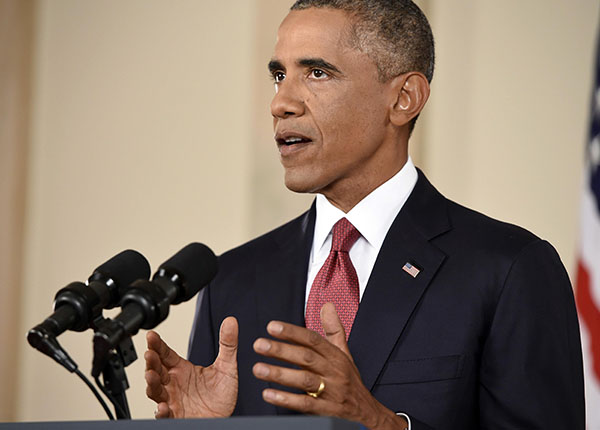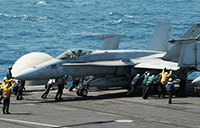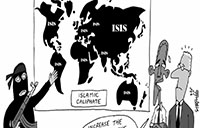 |
|
US President Barack Obama delivers a live televised address to the nation on his plans for military action against the Islamic State, from the Cross Hall of the White House in Washington September 10, 2014. [Photo/Agencies] |
WASHINGTON - Opening a new military front in the Middle East, President Barack Obama authorized airstrikes inside Syria for the first time Wednesday night, along with expanded strikes in Iraq as part of "a steady, relentless effort" to root out Islamic State extremists and their spreading reign of terror.
 |
| Beijing 'open' to US airstrikes in Iraq? |
?
 |
| Islamic State a threat to the world |
Obama announced that he was dispatching nearly 500 more troops to Iraq to assist that country's besieged security forces, bringing the total number of American forces sent there this summer to more than 1,500. He also urged Congress anew to authorize a program to train and arm Syrian rebels who are fighting both the Islamic State militants and Syrian President Bashar Assad.
Obama's plans amounted to a striking shift for a president who rose to political prominence in part because of his early opposition to the Iraq war. While in office, he has steadfastly sought to wind down American military campaigns in the Middle East and avoid new wars?- particularly in Syria, a country where the chaos of an intractable civil war has given the Islamic State space to thrive and move freely across the border with Iraq.
Speaking on the eve of the anniversary of the Sept. 11, 2001, attacks, Obama's plans were also an admission that years of American-led war in the Middle East have not quelled the terror threat emanating from the region.
Obama insisted he was not returning combat troops to the Middle East. Even so, he acknowledged that "any time we take military action, there are risks involved, especially to the servicemen and women who carry out these missions."
"But I want the American people to understand how this effort will be different from the wars in Iraq and Afghanistan. It will not involve American combat troops fighting on foreign soil," he added.
The president's announcements follow a summer of deliberation at the White House over how to respond to the violent Islamic State militants. While administration officials have said they are not aware of a credible threat of a potential attack by the militants, they say the group poses risks to Americans and interests across the Middle East. Officials are also concerned about the prospect that Westerners, including Americans, who have joined the militant group could return to their home countries to launch attacks.
In recent weeks, the militants have released videos depicting the beheading of two American journalists in Syria. The violent images appear to have had an impact on a formerly war-weary public, with multiple polls in recent days showing that the majority of Americans support airstrikes in both Iraq and Syria.
The began launching limited airstrikes against Islamic State targets in Iraq earlier this summer at the request of that country's former prime minister. But Obama vowed that he would not commit to a deeper military campaign until Iraq formed a new government that allowed greater participation from all sects, a step Iraqi leaders took Tuesday.
Officials said Obama plans to proceed with both the broader airstrikes in Iraq and the strikes in Syria without seeking new authorization from Congress. Instead, he is to act under a use-of-force authorization Congress passed in the days after 9/11 to give President George W. Bush the ability to go after those who perpetrated the terror attacks. Obama has previously called for that authorization to be repealed, but he has also used it as support for strikes against terror targets in Yemen and Somalia.
Obama compared the new mission in Iraq and Syria to the actions in Yemen and Somalia, campaigns that have gone on for years.
"This counterterrorism campaign will be waged through a steady, relentless effort to take out ISIL wherever they exist, using our air power and our support for partner forces on the ground," he said.
Obama is seeking authorization from Congress for a Pentagon-led effort to train and arm more moderate elements of the Syrian opposition. Even before his remarks, congressional leaders were grappling with whether to support that request and if so, how to get such a measure through the fractured legislature before the November elections.
The White House wants Congress to include the authorization in a temporary funding measure lawmakers are expected to vote on before adjourning later this month. Republicans have made no commitment to support the request and the House Republican Party has so far not included the measure in the funding legislation.
A spokesman for Senate Majority Leader Harry Reid said the Nevada Democrat might opt to seek separate legislation.
While the CIA currently runs a small program to arm the rebels, the new version would be more robust. Obama asked Congress earlier this year to approve a $500 million program to expand the effort and put it under Pentagon control, but the request stalled on Capitol Hill.
Some of Obama's own advisers, including former Secretary of State Hillary Rodham Clinton, pressed him to arm the rebels early in their fight against Assad. But Obama resisted, arguing that there was too much uncertainty about the composition of the rebel forces. He also expressed concern about adding more firepower to an already bloody civil war.
The White House announced Wednesday that it was also providing $25 million in immediate military assistance to the Iraqi government as part of efforts to combat the Islamic State.
The Treasury Department will also step up efforts to undermine the Islamic State group's finances. David Cohen, Treasury's undersecretary for terrorism and financial intelligence, wrote in a blog post that the would be working with other countries, especially Gulf states, to cut off the group's external funding networks and its access to the global financial system.
The has been pressing allies in Europe, the Middle East and elsewhere to help with efforts to degrade the terror group.
France's foreign minister said Wednesday that his country was ready to take part in airstrikes against extremist fighters in Iraq if needed. And the German government announced that it was sending assault rifles, ammunition, anti-tank weapons and armored vehicles to Kurdish forces in Iraq fighting, breaking with Berlin's previous reluctance to send weapons into conflicts.
Secretary of State John Kerry is traveling to Saudi Arabia and Jordan this week. He first made a stop in Baghdad to meet with Iraq's new leaders and pledge support for eliminating the extremist group.